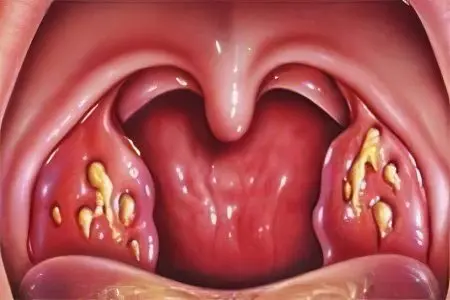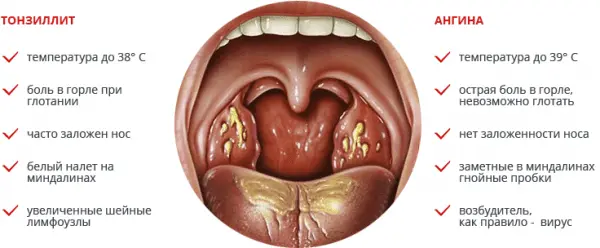Contents

Chronic tonsillitis is a periodic inflammation of the palatine tonsils, which occurs against the background of a local decrease in immunity. Tonsils in chronic tonsillitis are a source of infection that poisons the entire body, contributes to its allergization. If during remission the disease does not betray itself in any way, then during the period of exacerbation a person’s body temperature rises, tickle and sore throat appear, lymph nodes increase in size.
Tonsillitis is dangerous for its complications, including pyelonephritis, inflammation of the joints, adnexitis, prostatitis and many others. There are many factors that contribute to the formation of chronic tonsillitis. Especially often suffer from tonsillitis residents of large cities, as well as people subject to constant stress. A monotonous diet and an abundance of chemicals in food negatively affect local and general immunity.
Causes of tonsillitis in adults
Tonsils perform the most important protective function in the human body. They prevent pathogenic microorganisms from food, water and inhaled air from entering the respiratory tract by producing lymphocytes, interferon and gamma globulin. In the lacunae and crypts of the tonsils, not only “beneficial” bacteria, but also conditionally pathogenic flora exist on an ongoing basis.
If a person’s immunity functions in full, then inflammation does not develop, since the concentration of harmful bacteria is low, and their growth is suppressed by the natural forces of the body. Just as imperceptibly for a person, “good” bacteria fight pathogenic microorganisms coming from the external environment. However, for a number of reasons, this invisible balance can be disturbed, which will lead to an increase in the number of harmful bacilli and the development of tonsillitis, which is characterized by acute inflammation of the tonsils, can occur in the follicular and lacunar form.
Sometimes the disease acquires a protracted course, it is difficult to treat with medication, which leads to a decrease in local protection. As a result, the tonsils do not cope with the function assigned to them, they lose the ability to cleanse themselves, and a person develops chronic tonsillitis. Most often, it is the result of untreated acute tonsillitis, although in about 3% of cases the disease can develop without prior acute inflammation of the tonsil tissue.
In patients with chronic tonsillitis, about 30 types of different harmful bacteria can be sown from the tonsils. In the lacunae themselves, the pathogenic flora is usually represented by streptococci and staphylococci.

There are diseases that act as factors provoking chronic tonsillitis:
The presence of polyps in the nose, proliferation of adenoids, bacterial sinusitis, sinusitis, deviated septum. All of these diseases act as foci of infection from which bacteria can spread to the tonsils. In addition, the listed pathologies contribute to the violation of nasal breathing, which can also cause inflammation.
Measles, tuberculosis, scarlet fever and other infectious diseases lead to a deterioration in the body’s resistance. This is especially true for those patients who do not receive adequate therapy, or their disease has a severe course.
Hereditary predisposition is of some importance in terms of the development of chronic tonsillitis in the closest blood relatives.
Other risk factors include:

Subcooling the body.
Insufficient water intake throughout the day, as well as drinking low-quality drinks. A person needs at least 2 liters of water daily, and you should pass it through a filter or purchase already purified water.
Frequent stress and existence in constant mental stress, poor quality and insufficient sleep, depression and chronic fatigue.
Unfavorable working conditions, work in a dusty and gassed room.
Poor environmental conditions in the place where a person lives. The danger is represented by industrial enterprises, overcrowding of road transport, high levels of radiation, and the use of low-grade household chemicals for household use. You should get rid of carpets, furniture made from toxic materials, low-quality appliances, household chemicals with chlorine, washing powders with a high content of surfactants.
Bad habits: smoking and alcohol abuse.
Errors in nutrition, excessive consumption of foods rich in fast carbohydrates, insufficient presence of fresh vegetables, fruits, herbs, cereals on the table.
On healthy tonsils, the lymphoid tissue is tender, there are no scars on it. If a person suffers from chronic tonsillitis, then the tissues undergo pathological changes, thicken, scar, and are replaced by coarse connective cellular material. Scars block access to lacunae, which provokes the formation of closed foci containing pus in them. These are the so-called lacunar plugs. They accumulate microbes, dust particles, tobacco tar, dead epithelial cells.
Closed gaps are pockets in which ideal conditions are created for the reproduction of pathogenic bacteria. The more they become, the more actively they release toxic substances. They penetrate into the blood and with its current spread throughout the body, penetrating into every organ and provoking chronic intoxication.
Of course, this is not a fast process, it happens gradually, but systematically. As a result, not only local immunity suffers – it turns out to be undermined by the protective mechanism of the body as a whole. Moreover, streptococci can provoke severe complications.
Symptoms of tonsillitis

There are several forms of the course of the disease, each of which has a certain symptomatology:
Simple recurrent tonsillitis. In this case, the person often suffers from recurring sore throats. Symptoms are mild, the disease is characterized by the presence of purulent plugs on the surface of the tonsils, their swelling, swollen lymph nodes. A person feels as if he has a foreign body in his throat, which causes discomfort while swallowing food. When remission occurs, all symptoms completely disappear. Angina with a simple form of chronic tonsillitis occurs in humans, on average, 3 times a year. At this time, there is an increase in body temperature and general weakness. After each episode of the disease, the body recovers for a rather long time.
Simple protracted tonsillitis, when the disease has a sluggish course and does not go away for a long time.
Simple compensated tonsillitis, when exacerbations rarely bother a person.
Toxic-allergic tonsillitis. It is divided into 2 subspecies:
The tonsils are inflamed, there are symptoms of allergization and intoxication of the body. The patient suffers from high temperature, pains in the region of the heart join, but the ECG does not reveal any abnormalities. Also, a person has joint pain, general fatigue is observed. People endure other infectious diseases quite hard, the recovery period takes a long time.
The patient’s tonsils are inflamed on an ongoing basis, so bacteria spread from them throughout the body. This provokes pathological changes in the kidneys, joints, liver, heart (on the ECG rhythm changes are detected, the formation of heart disease is possible). With this form of toxic-allergic tonsillitis, rheumatism, arthritis develop, and the genitourinary system is involved in the pathological process. In this case, the body temperature may remain at subfebrile values, and the patient himself will complain of increased fatigue and weakness.

Can chronic tonsillitis be permanently cured?

It is impossible to cure chronic tonsillitis forever, because pathogenic bacteria are present not only in the air, water, food, but also in the human body itself. However, for healthy immunity, they do not pose a danger. The body will cope with them on its own, and this struggle will go unnoticed by a person. When the immune system fails, any infection poses a threat to health.
Another reason that does not allow once and for all to forget about such a disease as tonsillitis is the ability of bacteria to adapt and adapt to changes in their surrounding conditions. That is, these microorganisms have the ability to develop resistance to antibacterial drugs. Therefore, the habit of taking antibiotics at one’s own discretion, in situations where one could do without them, is very dangerous. In response to the action of the drug, bacteria produce enzymes that negate all of its therapeutic effect. As a result, part of the pathogenic flora survives and continues to poison the body, and also passes on defense mechanisms by inheritance to its future generations.
There is a third reason why it is impossible to get rid of chronic tonsillitis forever. The disease is often caused by a bacterium such as Staphylococcus aureus. It actively reproduces, after which it forms colonies that exist in films that have many layers. With the help of taking medications, it is possible to destroy only the top layer of this protection. The remaining layers of bacteria remain quite viable.
General recommendations for the treatment of tonsillitis. In order for the immune system to be able to resist the disease, it needs help and support from the person himself.
To increase the protective potential of your own body, you must adhere to the following recommendations:
Go in for sports, give up a sedentary lifestyle.
Eat right, giving preference to healthy foods.
Carry out hardening procedures.
Give up all bad habits. Tonsils are especially affected by tobacco smoke, which reduces their ability to resist harmful bacteria.
Regularly do wet cleaning in the room, use the device to humidify the air.
It is possible that some people will be against such a useful event as hardening. The reason for this may be the argument about the recurrence of the disease on the background of hypothermia. However, hardening does not mean abruptly starting to dive into an ice hole or douse yourself with ice water. Hardening of the body should begin gradually, with a gradual decrease in the temperature of water and air. This will allow the body to turn on its own adaptive mechanisms without making a sharp exit from the usual comfort zone. Adults should take into account the hardening system developed by Porfiry Ivanovsky. The techniques of Komarovsky, Tolkachev, Grebenkin are excellent for children.
To harden, you can use a regular shower. To do this, you should change the temperature of the water, making it either hot or cool. The water temperature contrast should not be sharp. You need to start with a few degrees, gradually increasing the discrepancy.
Treatment of tonsillitis
If a person has chronic tonsillitis, which is not in the acute stage and does not manifest itself in any way, then antibacterial drugs are not prescribed to him. In this case, anti-allergic drugs and the use of sprays with antiseptic properties may be indicated. To disinfect the tonsils, gargling is possible.
When tonsillitis worsens, the patient needs to take antibiotics. They will prevent the growth of pathogenic flora and prevent its intensive reproduction.
penicillin group. Drugs belonging to the penicillin group can not only alleviate the patient’s condition, but also prevent the development of complications that often cause streptococci.
A group of cephalosporins and macrolides. Preparations from the group of macrolides can prevent the growth and development of pathogenic flora, that is, they have a bacteriostatic effect. They are able to penetrate the cell membrane and infect the bacteria inside them.
Cephalosporins – These are drugs that can destroy bacteria that have developed resistance to antibiotics of the penicillin group.
group of aminoglycosides. This is a group of antibacterial drugs that are able to cope with even the most complex infection, but they have one significant drawback – high toxicity. Therefore, aminoglycosides are prescribed only for the treatment of chronic tonsillitis in the stage of decompensation. Preference should be given to 3rd generation drugs that have minimal toxicity.
Washing the tonsils. During an exacerbation of the disease, doctors recommend undergoing a procedure for washing the tonsils with antiseptics. High-quality washing of the tonsils is possible by directing the jet of the drug into the gaps. With the help of a special apparatus, the doctor can not only wash, but also suck out the pathological contents of the tonsils. As a result, the inflammation quickly passes, the patient’s well-being improves. Exacerbations of the disease occur much less frequently.
Operative therapy
The help of a surgeon may be required only as a last resort, when it is not possible to cope with the disease in other ways, and it becomes severe. Only surgery guarantees complete relief from tonsillitis, but doctors are extremely reluctant to take such a drastic measure.
The fact is that the tonsils are important organs of the immune system, they allow you to protect the body from allergens and infectious agents, in addition, they produce useful macrophages and lymphocytes. If you remove the tonsils, then the body will be partially deprived of protection, which will contribute to the weakening of local immunity.
Therefore, one should not strive at all costs to remove the tonsils. It is necessary to make every effort to cope with tonsillitis with the help of conservative therapy. If the treatment is built correctly, then the quality of a person’s life will increase significantly, and after a while he will completely forget about the recurrence of the disease.









